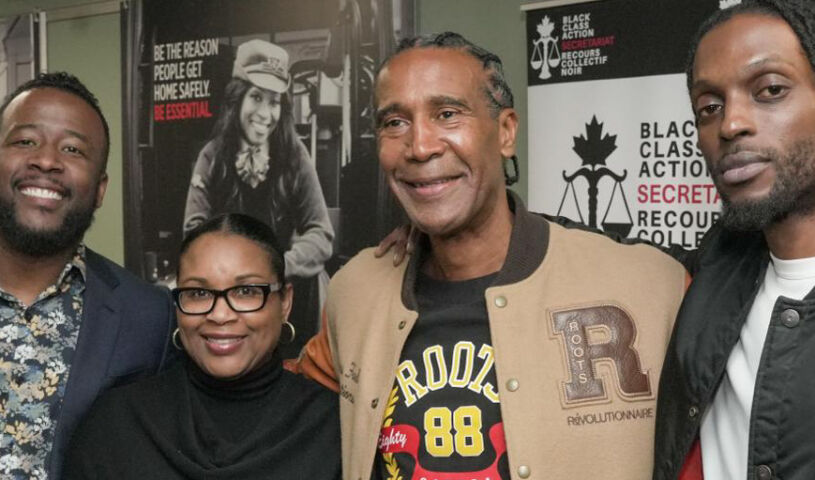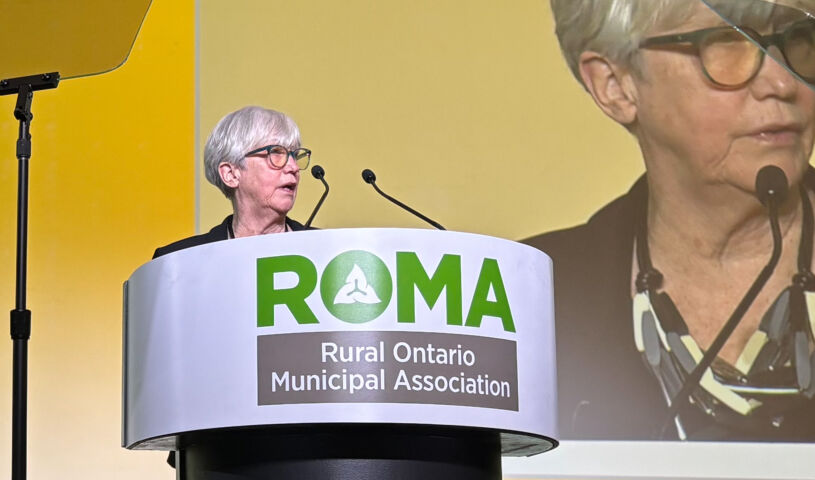Black History Month 2024 shines light on excellence
 Velma Morgan, chair of Operation Black Vote Canada, along with (from left) Nicholas Marcus Thompson, Courtney Betty, and Zaid Stroude joined others in recognizing recipients of the Bob Marley Day Humanitarian Awards. Feb. 6 was Marley’s birthday and for 33 years the City of Toronto has proclaimed it Bob Marley Day in recognition of the artist’s advocacy for universal love, acceptance, and social change. Photo: Velma Morgan
Velma Morgan, chair of Operation Black Vote Canada, along with (from left) Nicholas Marcus Thompson, Courtney Betty, and Zaid Stroude joined others in recognizing recipients of the Bob Marley Day Humanitarian Awards. Feb. 6 was Marley’s birthday and for 33 years the City of Toronto has proclaimed it Bob Marley Day in recognition of the artist’s advocacy for universal love, acceptance, and social change. Photo: Velma Morgan
February is Black History Month and this year’s theme is all about celebrating Black excellence.
On Jan. 16, Kamal Khera, Minister of Diversity, Inclusion and Persons with Disabilities, announced that nearly $370,000 has been awarded to support 14 Black-led and focused organizations in British Columbia. During the event, Khera also revealed this year’s theme for Black History Month: Black Excellence: A Heritage to Celebrate; a Future to Build.
“This month is an opportunity to celebrate these agents of change and recognize their achievements,” Khera said in a statement. “At the same time, it also offers us the chance to rededicate ourselves to addressing the systemic barriers that continue to be a daily reality for Black Canadians.”
The funding is being provided under the Events component of the Multiculturalism and Anti-Racism Program and the Supporting Black Canadian Communities Initiative. The Multiculturalism and Anti-Racism Program has three distinct components: Events, Projects and Organizational Capacity Building.
The current Call for Proposals is for the Organizational Capacity Building component of the program. Khera said the investments “will support Black-led, Black-focused organizations in British Columbia in amplifying Black voices throughout Black History Month and beyond, fight anti-Black racism, and help increase capacity to better serve Black communities in the province.”
Bob Marley Day Humanitarian Awards
On Feb. 5, Toronto’s City Hall was host to the annual Bob Marley Day Humanitarian Awards. The awards are held every year to recognize the work and achievements of Black individuals and organizations.
This year’s theme was “One Love,” taken from Marley’s famous song of the same name. In a press release, Bob Marley Day Committee said the awards “have been a symbol of recognition for those who not only make a difference but also inspire others to build a better world. This year, under the theme ‘One Love,’ we continue to acknowledge the unwavering dedication of individuals who contribute to the positive transformation of our communities.”
The awards have been held every year since 1991 in early February to mark Marley’s birthday. Since 1991, every mayor of Toronto has officially declared Feb. 6 Bob Marley Day in the city.
Velma Morgan, who is on the Bob Marley Day Committee, said the awards model Marley’s ideals of unity and coming together. Morgan is also chair of Operation Black Vote, an organization focused on encouraging Black people to get involved in politics.
Toronto Coun. Amber Morley was among those celebrated this year. Morley is the first Black woman to be deputy mayor in Toronto.
“I am proud to be the first Black woman to serve as a Deputy Mayor in the history of the City of Toronto,” Morley said in a statement marking Black History Month. “It is a privilege to be in this role and I hope to inspire young Black women across the city.”
The awards also recognized the Black Talent Initiative, an organization shining a spotlight and empowering Black people. When it comes to this month’s theme of Black excellence, Morgan said that it was vital to recognize the wealth of talent and creativity in Black communities.
“We have tons of excellence in our communities,” Morgan said. “We just need to provide them with the opportunities and they will soar.”
Push for Greater Voter Engagement
Morgan and Operation Black Vote are also focused on getting Black Canadians more involved in politics, both as voters and candidates. This year is going to see provincial and municipal elections in a number of provinces and territories. Operation Black Vote is focused on getting Black voters the information they need to be engaged.
“Our goal is to provide Black communities across Canada with the information they need to be informed voters,” Morgan said. She added that Black communities aren’t often targeted for that kind of information, making it critical for organizations like Operation Black Vote to step in. That can include training and working on campaigns, or providing information about when and where to vote and how to get there.
But its not just about voters being engaged, Morgan said. All orders of government need to take an active role in reaching out to Black communities. Importantly, she added, that outreach needs to be a constant process, not something limited to Black History Month or other events.
“They have to do the work every single day to engage with our community in an authentic way, because we know when it’s just for show,” Morgan said.
For Morgan that means going to where Black communities are, making information accessible and partnering with Black organizations to do that outreach. Crucially, it also means having more Black people at the decision-making table. “Employ Black people to make those decisions,” Morgan said.
It is also important for governments to recognize and appreciate the diversity within Black communities. Statistics Canada census data shows that around 60 per cent of Black people in Canada were born abroad. While earlier generations of immigrants were predominantly from Caribbean countries, more recent immigrants are coming from African countries.
“We are so diverse in who we are and where we’re from and in order to reach us there’s different strategies,” Morgan said.
Vancouver Focus on Black Business
This year, the City of Vancouver is partnering with the Black Business Association of BC (BBABC) to encourage Vancouverites to support Black-owned businesses. BBABC has provided an interactive map of Black-owned businesses on their website to help highlight Black businesses and organizations residents can support.
“The strength and success of any community relies on the commitment of its citizens to work together towards unified growth,” said Nerissa Allen, president and CEO of BBABC. “Vancouver will continue to prosper due to the wonderful diversity of culture and business that underpins the city.”
The cities focus on supporting businesses was informed by recommendations from the City of Vancouver’s Black and African Diaspora Community Advisory Committee who identified ‘advancing economic wellbeing’ as one of their top priorities.
“As we honour Black History Month, let us unite in supporting the numerous Black and African diaspora entrepreneurs in Vancouver – not just in February, but year-round, as we strive to build an inclusive and flourishing community for all,” said Mayor Ken Sim.
Celebration of Black Nova Scotians
Nova Scotia is also celebrating its 40th annual African Heritage month, and this year’s theme is: Our Smiles, Our Joy, Our Resilience as African Nova Scotians.
Crystal D. Mulder, co-Chair of the Black History Month Association, said this year’s theme is “embodied in the joy and pride that is felt when we share our history and culture. A culture that highlights the resilience of the Black Nova Scotian community that has survived and thrived over 400 years here in Nova Scotia.”
The province is home to 52 historic African communities. Around 2.4 per cent of Nova Scotians identify as African Nova Scotian, and 71.8 per cent of African Nova Scotians have roots in the province going back three generations or more. The first Black History Month in Nova Scotia was observed in 1988 and renamed African Heritage Month in 1996.
Twila Grosse, provincial Minister of African Nova Scotian Affairs said the heritage month was also about highlighting the histories of the province’s African communities and their people.
“As we celebrate African Heritage Month, we are reminded of the remarkable journey of our 52 historic African Nova Scotian communities and the various journeys of people of African descent who now call Nova Scotia home – these journeys are defined by resilience, wisdom and hope,” she said.
Focus on Black History
Black History Month was first celebrated in Canada in 1950.
According to the 2021 census Canada’s Black population reached 1.5 million, accounting for 4.3 per cent of the total population and just over 16 per cent of the racialized population. Statistics Canada projects that the country’s Black population is expected to double to three million by 2041.
2024 also marks the final year of United Nations’ International Decade for People of African Descent. The decade, proclaimed in 2015, is meant to focus on historical injustices and development for people of African descent. MW
✯ Municipal World Executive and Essentials Plus Members: You might also be interested in Rumina Morris’s article: London’s anti-racism and anti-oppression framework: Leading change.
Ibrahim Daair is Staff Writer at Municipal World.
Related resource materials:



